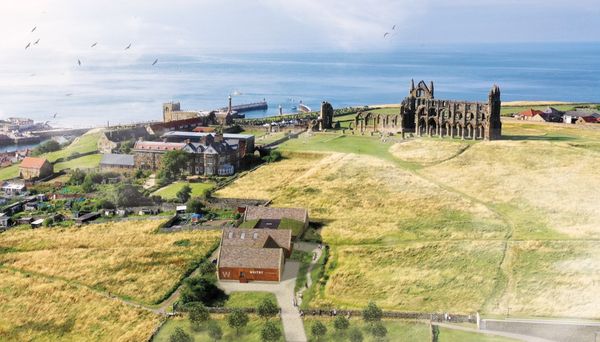Award-winning Whitby distiller paves way to prime Abbey location





The dream of an award-winning Yorkshire gin-maker to move into brand-new new premises in the shadow of Whitby Abbey is now becoming a reality.
Work is beginning this autumn on Whitby Distillery’s £1.8 million project to renovate two derelict barns on Abbey Lands on the south-west corner of the Abbey grounds.
The build programme, which has been partly funded by the Whitby Distillers Founders Club, is scheduled to be completed by the end of next year. It will feature a unique pathway, engraved with the names of friends and supporters of the distillery.
Whitby Distillery, makers of Whitby Gin, was founded in 2017 by Jessica Slater and Luke Pentith who have grown their business from a passion project to one whose gin stocked in more than 500 outlets across the UK.
The move will enable the distillery to become one of the most iconic distillery visitor experiences in England, providing high-quality leisure and function space for the local community to enjoy.
Luke Pentith commented: “This move is a gamechanger for us. Whilst we have been very happy in our current premises in Botany Way in Whitby, our new home will take Whitby Distillery to the next level, stepping up production and giving visitors the opportunity to see us distilling and bottling through the week with our tour experiences.
“It is an honour and a privilege to be restoring these derelict buildings on such a world-famous site. For us, this is all about launching an amazing adventure on the atmospheric North Sea coastline, with tremendous knock-on effects for the local economy,” said Luke.
As part of this exciting project, Whitby Distillery is giving people the opportunity to set their family's name in history and to celebrate the life of a loved one for future generations. This initiative was launched last month and already over 200 places have been sold.
Jess Slater explained: “In the grounds of our new distillery, we are creating a unique pathway leading into our new home. The Spirits Walkway will be a part of history, created and set in a cast iron plates, allowing people to be a part of this wonderful adventure and feature their names or family names on the glorious path. All proceeds from the walkway, which will be laid when the building programme is completed, will go towards the cost of our new distillery.
“We are confident that tourists and Whitby residents alike will cherish this unparalleled walkway for decades to come,” she added.
Jessica explained: “Our new distillery is a serious commitment to Whitby. We are making a significant investment into the local community and the future of the town. In the longer term, we anticipate up to 25 employees.
“As well as the distillery, our plans include a visitor centre, which will showcase our production process and our various spirits, as well as paying homage to the amazing cultural heritage of Whitby and providing an educational and corporate business space.
“Whitby Distillery aims to offer an educational and enchanting visitor experience which can be accessed all year round, as an out-of-season and wet weather destination. The visitor experience venue and exhibition/hire space build on the strong links Whitby distillery has with the adjacent English Heritage attraction.”
Whitby Distillery’s products are crafted using hand foraged botanicals from the Yorkshire coast and moorland and more than 1000 bottles of it are sold every week. It was already won a raft of awards, including the Best British London Dry Gin category at the World Gin Awards.
“The site has these incredible views of the Abbey, the town, the moors and the sea and no-one gets to see it as the area is closed off at the moment. We want to use the area for people to be able to take tours and also host small events up there,” she said.
Luke added: “The renovation work is partly be funded by Whitby Distillery’s Founders Club, which gives members to chance to become part of the Whitby Distillery success story.
“We have chosen to work with Native Architects who are the experts when it comes to sustainable redevelopment of heritage buildings. They value the qualities of traditionally crafted buildings but adapt and convert in a way that sets the reduction of CO2 emissions as a priority.
“Whitby Distillery is designed to be an inspirational building that has minimal environmental impact. We are taking a ‘fabric first’ approach to refurbishment to improve the energy efficiency. Wastewater from the distilling process will be used where possible to irrigate plants and the vegetated roof.
“The heat extracted from this water will be used to warm the building. Green roofs will be planted with wildflowers to nurture the natural plants and wildlife. Hidden roof solar PV panels will generate electricity on site. Building materials can have high carbon footprints so materials have been selected that have low levels of embodied carbon.”